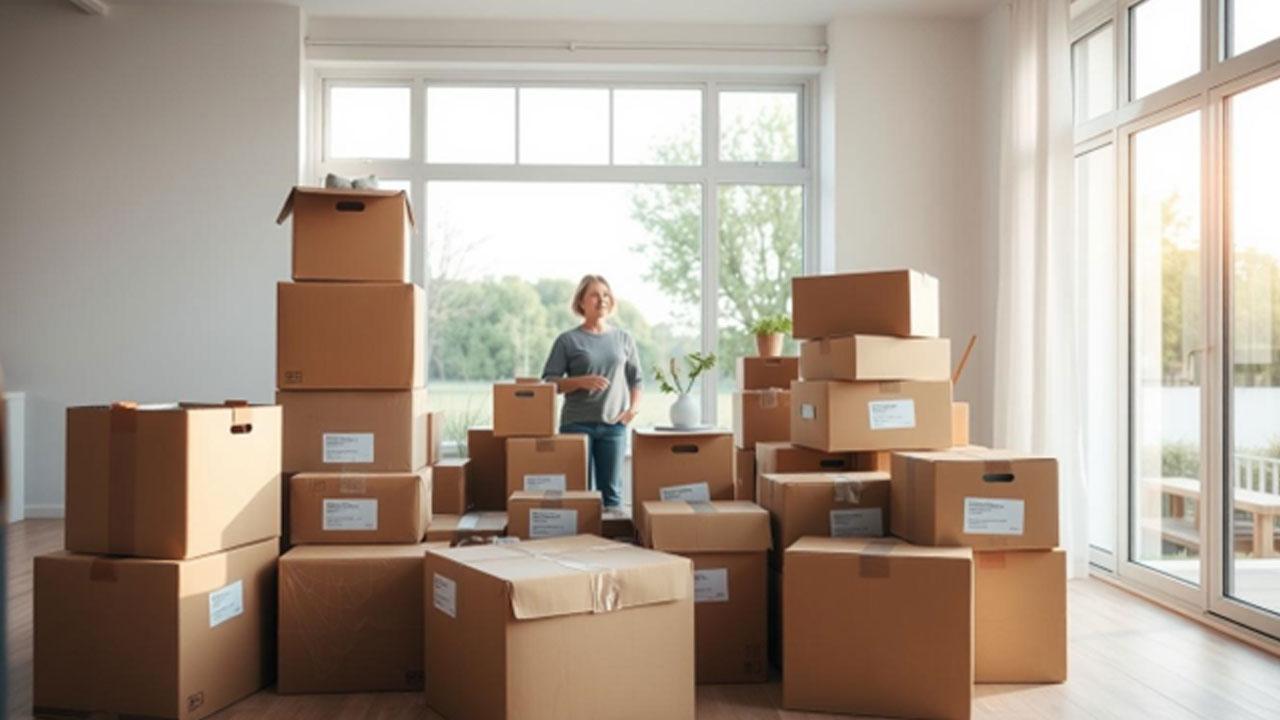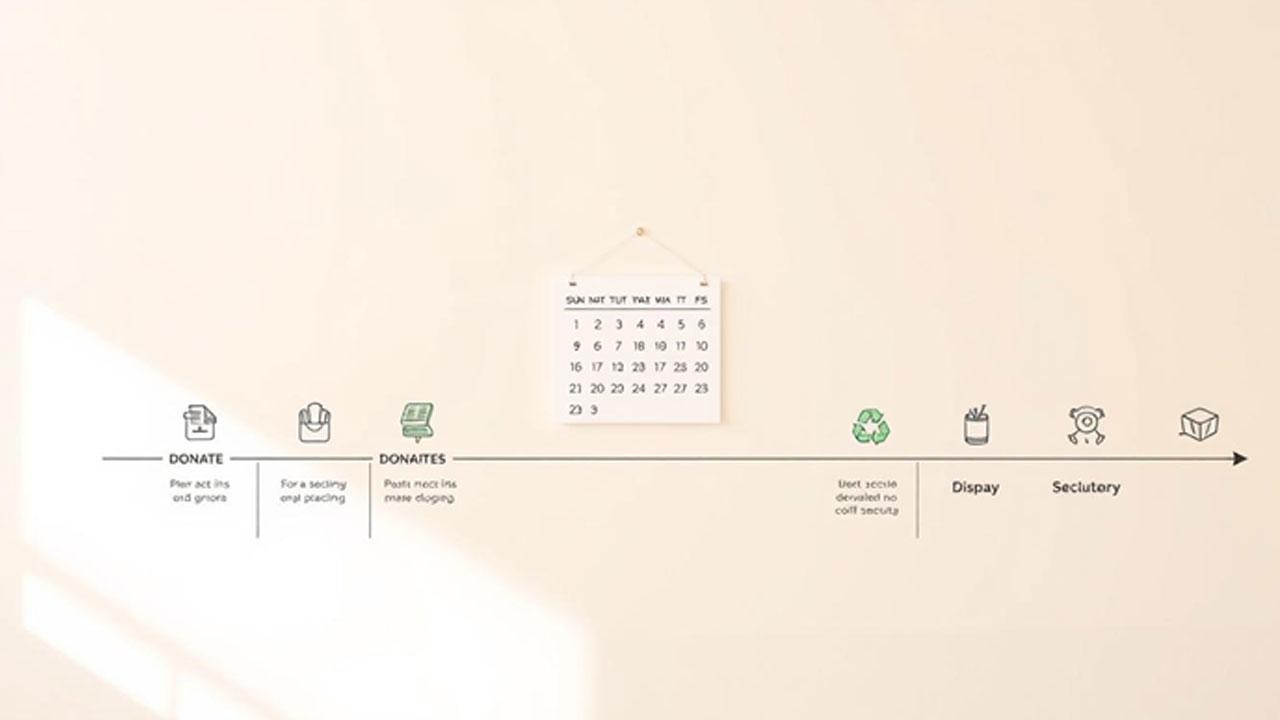UK movers like APM Removals say decluttered clients unpack 40% faster. Less stuff means more space to design your new space

Decluttering
Decluttering before you move can save you time and reduce stress. It makes your move simpler. This guide will show you how decluttering before moving can change your experience. It will give you practical steps to do it without feeling overwhelmed.
Key Takeaways
- Decluttering before moving reduces packing costs and effort.
- Efficient decluttering prioritises items you need, minimising unnecessary baggage.
- Organised sorting maximises moving benefits like faster unpacking at your new home.
- A clear plan ensures you only move what adds value to your life.
- Strategic disposal options keep the process environmentally responsible.
Why Decluttering Before Moving Makes Sense
Preparing to move doesn't have to be stressful. Decluttering first offers practical and mental benefits. It makes your move easier. Here are three reasons to start early.
The Psychological Benefits of Starting Fresh
Clearing clutter improves your mental health. A study by the British Psychological Society shows that psychological benefits of decluttering include less anxiety and a clearer mind. Imagine moving into a new home without old stressors.
As one UK resident said:
“Letting go of unused items felt like hitting reset on my life.”
Reducing Your Moving Costs Significantly
Decluttering cuts costs in three main ways:
- Fewer items = smaller vans (save £50-£200 per move)
- Less packing materials needed (boxes, tape, and labour costs drop by up to 30%)
- Avoiding storage fees for rarely used items
|
Scenario |
Cost Difference |
|
Decluttered Move |
Average savings: £150-£400 |
|
Unprepared Move |
Risk of overpaying for oversized vehicles |
Making Unpacking and Organising Easier
Organised unpacking begins with decluttering. Here's a simple plan:
- Donate unwanted items before packing
- Label boxes by room and priority
- Unpack essentials first in your new home
UK movers like APM Removals say decluttered clients unpack 40% faster. Less stuff means more space to design your new space.
When to Start Your Decluttering Process
Start planning your decluttering timeline early to avoid stress. Begin by counting how much you own. Most homes need 8–12 weeks to sort through everything before moving.
Use a simple checklist to stay on track. Mark important dates and set weekly goals. This helps keep you organised.

Start with the room-by-room decluttering method. Begin in busy areas like kitchens and living rooms. Save sentimental items or small spaces like attics for later.
Here’s a quick guide:
- Week 1–2: Tackle living spaces and essentials
- Week 3–4: Move to bedrooms and storage areas
- Week 5–8: Organise seasonal items and final sort-outs
If time is tight, use last-minute decluttering strategies. Focus on key areas like entryways or dining areas. Use three boxes labelled “keep”, “donate”, and “discard” to make quick decisions.
Online platforms like eBay or Freegle UK can quickly list unwanted items. This saves time and effort.
Remember, progress is more important than perfection. Be flexible with your plan. A well-paced schedule ensures you’re ready to move without regrets.
Clearing Out Unwanted Items Making the Relocation Smoother and More Cost-Effective
Decluttering is more than just making space. It's a smart way to save money when moving. By getting rid of old items, you pack fewer boxes. This means less time and effort for you.
UK removal firms say homes with less stuff save up to £200. This is on van space and labour costs.

Less clutter makes moving easier. Imagine packing only what you really use. This makes loading furniture into vans simpler and reduces damage risk.
Experts at RemovalsPro UK say decluttered homes move 30% faster. This reduces stress on moving day.
- Donate clothes and books to charities like British Red Cross to lighten your load.
- Discard broken items to avoid paying for unnecessary transport.
- Use online platforms like Facebook Marketplace to sell duplicates, turning unused items into extra cash.
“We see clearer homes move twice as fast. Fewer items mean fewer headaches.” – Sarah Clarke, Operations Manager at Citywide Relocations
Keeping every item adds to costs. A study by UK Moving Statistics 2023 found families decluttering 30% saved £150 on fees. Focus on what you really need and let go of the rest. Your wallet and new space will appreciate it.
Essential Supplies for Efficient Decluttering
Getting organised for your move means having the right tools. These supplies make sorting, tracking, and packing easier. They help keep your move stress-free and affordable.
Sorting Boxes and Labelling Systems
Start with strong decluttering supplies like clear plastic or sturdy cardboard boxes. Use coloured labels—red for donate, green for keep—to make sorting easy. Waitrose stores give out free boxes, and Sainsbury’s has cheap labelling kits. A simple system makes decisions easier.
Digital Tools to Keep Track of Your Progress
Use apps like Todoist or Google Drive spreadsheets to track items. These organisation systems help you decide what to keep. For selling, Facebook Marketplace and Depop are great for finding buyers fast. Use tech with physical tags for clear organisation.
Where to Find Affordable Packing Materials in the UK
- Tesco and Argos sell affordable packing materials UK online or in-store.
- Online retailers like eBay offer second-hand boxes at a low cost.
- Supermarkets like Asda give away free wine boxes or fruit crates for heavy items.
Use free tape from Amazon or Wilko’s discount packs. Make sure every purchase is within your budget without sacrificing safety.
Creative Ways to Dispose of Your Unwanted Items in the UK
Turn decluttering into a chance to help others, make money, or protect the planet. Look into these UK-specific options for every item in your home.
Decluttering can be a win-win. You can donate, sell online, or recycle. Here's how to make the most of each choice:
British Charity Shops That Welcome Donations
Give to UK charity donations at places like Oxfam, British Heart Foundation, and Cancer Research UK. They need clean clothes, books, and small appliances. Visit their websites to arrange collections or find drop-off points. Some shops focus on winter coats in autumn.
Online Marketplaces for Quick Sales
Use online selling sites like Facebook Marketplace, Gumtree, or eBay. Set prices with tools like Poshmark’s guide. Offer free local pickups to draw buyers. Tip: group small items to save on delivery.
Council Collection Services and Recycling Options for Your Junk
Not sure what to do with your junk? Reach out to your local council for council recycling services. They collect big items like sofas and fridges. Costs differ—London charges £15-£35 per booking. See this table for common items:
|
Item Type |
Recommended Action |
|
Furniture |
Book council collection (e.g., Camden Council’s bulky waste service) |
|
Electronics |
Recycle via council e-waste drop-offs |
|
Broken appliances |
Check Local authority guidelines for hazardous waste |
For items not accepted, try Reuse Network UK or Freecycle groups. This way, you avoid landfills.
Tackling Difficult Decluttering Decisions
Emotional decluttering can be tough, especially with sentimental items. It's normal to feel unsure about letting go of childhood toys or gifts. But, with the right strategies, you can declutter without losing cherished memories.
Marie Kondo's method asks a simple question to help decide what's important. For items that aren't, try these steps:
- Create a “memory box” with one item from each life stage
- Digitise photos or handwritten notes to keep virtually
- Donate duplicates to UK charities like Oxfam or British Heart Foundation
When faced with a tough choice, ask yourself, “Will this fit into my new life?” If not, it's time to let go. For family heirlooms, keep one and photograph the rest. With children's artwork, rotate the pieces and recycle older ones. A photo keeps memories alive.
|
Item Type |
Action Plan |
|
Unused gifts |
Host a family swap or list on eBay |
|
Old hobby equipment |
Sell on Gumtree or donate to community centres |
|
Outgrown clothes |
Donate to British Red Cross or host a clothes swap |
Your new home is a new chapter. Letting go doesn't mean forgetting. It's about making space for what truly matters now. Start small, celebrate your progress, and enjoy the freedom of a lighter future.
To make the process even easier, you can enlist the help of professional junk removal services like Junk Bunk, ensuring that large or hard-to-dispose-of items are collected and handled responsibly, without the hassle.
Conclusion: Embracing a Lighter Move and a Fresh Start
Decluttering before moving makes the process easier. It saves time and money and reduces the amount to move. This also means a fresh start, making unpacking simpler.
Decluttering does more than just help with moving. It reduces stress and boosts confidence in your new space. In the UK, you can donate to charities like Oxfam or sell items online. Recycling ensures items are handled responsibly.
Start small and follow a plan to stay on track. Use labelled boxes and digital lists to help. Only keep items that are important for your new life. A lighter move means a more intentional lifestyle.
Begin today by reviewing your belongings. Choose what's most important and enjoy a clutter-free move. Your new home is waiting to show off your organised, stress-free life.
 Subscribe today by clicking the link and stay updated with the latest news!" Click here!
Subscribe today by clicking the link and stay updated with the latest news!" Click here!








